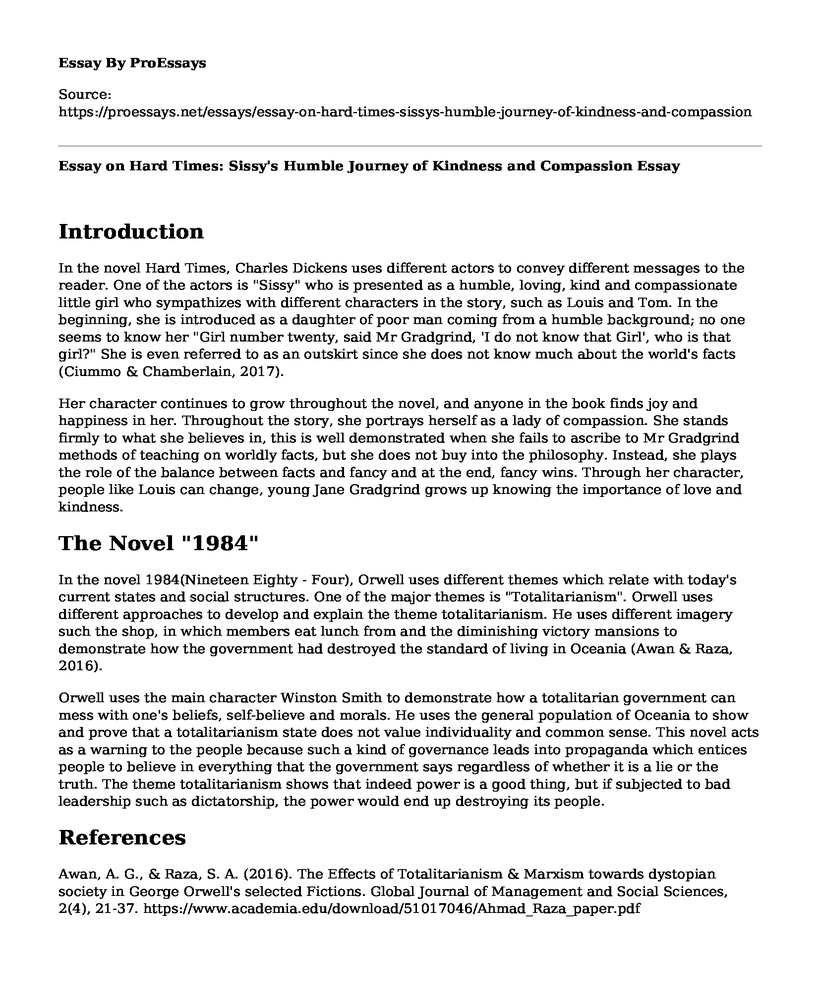Introduction
In the novel Hard Times, Charles Dickens uses different actors to convey different messages to the reader. One of the actors is "Sissy" who is presented as a humble, loving, kind and compassionate little girl who sympathizes with different characters in the story, such as Louis and Tom. In the beginning, she is introduced as a daughter of poor man coming from a humble background; no one seems to know her "Girl number twenty, said Mr Gradgrind, 'I do not know that Girl', who is that girl?" She is even referred to as an outskirt since she does not know much about the world's facts (Ciummo & Chamberlain, 2017).
Her character continues to grow throughout the novel, and anyone in the book finds joy and happiness in her. Throughout the story, she portrays herself as a lady of compassion. She stands firmly to what she believes in, this is well demonstrated when she fails to ascribe to Mr Gradgrind methods of teaching on worldly facts, but she does not buy into the philosophy. Instead, she plays the role of the balance between facts and fancy and at the end, fancy wins. Through her character, people like Louis can change, young Jane Gradgrind grows up knowing the importance of love and kindness.
The Novel "1984"
In the novel 1984(Nineteen Eighty - Four), Orwell uses different themes which relate with today's current states and social structures. One of the major themes is "Totalitarianism". Orwell uses different approaches to develop and explain the theme totalitarianism. He uses different imagery such the shop, in which members eat lunch from and the diminishing victory mansions to demonstrate how the government had destroyed the standard of living in Oceania (Awan & Raza, 2016).
Orwell uses the main character Winston Smith to demonstrate how a totalitarian government can mess with one's beliefs, self-believe and morals. He uses the general population of Oceania to show and prove that a totalitarianism state does not value individuality and common sense. This novel acts as a warning to the people because such a kind of governance leads into propaganda which entices people to believe in everything that the government says regardless of whether it is a lie or the truth. The theme totalitarianism shows that indeed power is a good thing, but if subjected to bad leadership such as dictatorship, the power would end up destroying its people.
References
Awan, A. G., & Raza, S. A. (2016). The Effects of Totalitarianism & Marxism towards dystopian society in George Orwell's selected Fictions. Global Journal of Management and Social Sciences, 2(4), 21-37. https://www.academia.edu/download/51017046/Ahmad_Raza_paper.pdf
Bhat, Z. A. (2019). Resistance in Literature: A Close Reading of Charles Dickens' Hard Times and Little Dorrit. International Journal of Applied Linguistics and English Literature, 8(2), 120-125.http://journals.aiac.org.au/index.php/IJALEL/article/view/5615
Ciummo, A., & Chamberlain, E. (2017). On Morality in Charles Dickens. Symbiosis. https://annaciummo2017.wordpress.com/on-morality-in-charles-dickens/
Sahoo, B. K. (2016). George Orwell in Our Time. Language in India, 16(6). http://www.languageinindia.com/june2016/sahoogeorgeorwell.pdf
Cite this page
Essay on Hard Times: Sissy's Humble Journey of Kindness and Compassion. (2023, May 29). Retrieved from https://proessays.net/essays/essay-on-hard-times-sissys-humble-journey-of-kindness-and-compassion
If you are the original author of this essay and no longer wish to have it published on the ProEssays website, please click below to request its removal:
- The Spanish Caribbean Literature and Culture: Essay Sample
- Anger and Social Disconnect in "A Hunger Artist" and "Barn Burning"
- Bedford Literature of the American Slave History Before 1865 Essay Example
- Critical Essay Sample on To Kill a Mockingbird
- Essay Sample on Ode to the West Wind: Expressing a Revolutionary Vibe
- Essay on Vietnam Veterans Memorial Hall: Honoring Sacrifices of U.S. Service Members
- Heritage in Everyday Use: Maggie vs Wangero - Essay Sample







